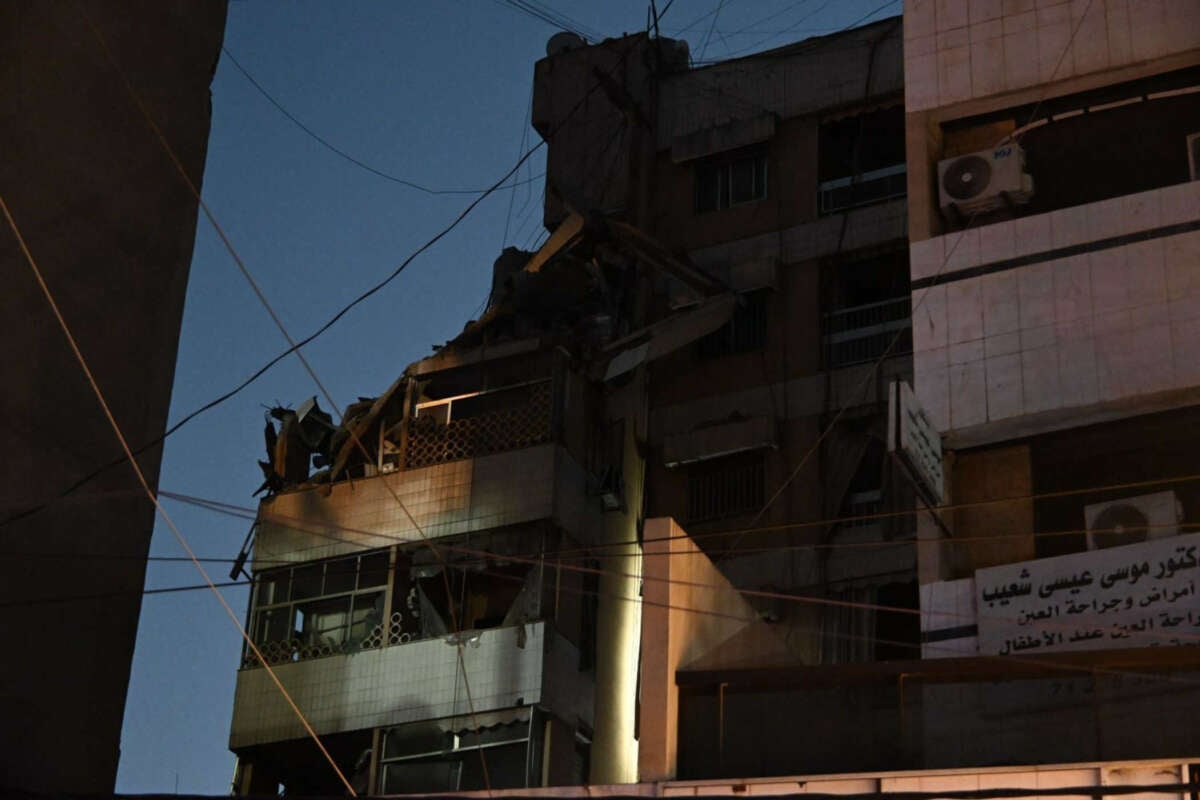Israel launched a strike on Beirut, Lebanon’s capital city, on Tuesday, killing one and wounding dozens of others in an escalation of Israel’s months of attacks on Hezbollah forces and civilian areas of Lebanon that have pushed the conflict to the brink of war.
Several sources reported that the attack, which Israel took responsibility for, was carried out by a drone in a populous area of a southern suburb of Beirut. Al Jazeera reported that the attack was carried out on an apartment in the zone where Hezbollah is known to operate.
The Lebanon health ministry reports the attack killed one woman and wounded 68 others. Initial reports have found that Israel’s target, a Hezbollah commander, survived the strike.
Pictures and video showed large smoke plumes coming out of the area Israel struck, with the blast creating panic in the region. CNN analysis showed that the strike destroyed at least five stories of the building it struck.
One senior official told CNN that Israel wanted to send a “very strong message” with the retaliatory strike. Lebanon Prime Minister Najib Mikati condemned the strike, saying it amounted to “blatant Israeli aggression” in a “series of aggressive operations killing civilians in clear and explicit violation of international law.”
Israeli forces claimed they were targeting a Hezbollah commander responsible for a rocket that fell on Saturday on Golan Heights, a region of Syria occupied by Israeli settlers. However, weapons experts have said that it is possible that Saturday’s strike on civilians was an accident, and have questioned why Israel’s Iron Dome did not intercept the rocket; Hezbollah suggested that it was possible the rocket was actually an Iron Dome misfire.
Israel has blamed Hezbollah for the Golan Heights bombing, which Israeli forces said killed 12 people and wounded 20 others. Hezbollah has denied responsibility.
In January, Israeli forces carried out an attack in Beirut that targeted Hamas officials. In that attack, an Israeli drone strike killed a Hamas military leader and several other Hamas soldiers in southern Beirut.
A major question now is how Hezbollah will react to the strike.
Tensions between Israel and Hezbollah, along with their allies, have escalated since Israel launched its genocidal assault on Gaza in October, with Hezbollah opposing Israel’s slaughter of Palestinians and attempting to push the Israeli military out of Gaza.
The vast majority of these attacks have been carried out by Israeli forces, with Israel having carried out four times as many attacks as Hezbollah has. Like their offensives in Gaza, Israel has been known to attack civilian areas in Lebanon in recent incursions and in past decades.
Since October, Israeli forces have killed over 100 Lebanese civilians, while also injuring hundreds by dropping white phosphorus on residential areas in southern Lebanon at least 17 times in what human rights groups have said is a war crime. Over the same period of time, 23 Israeli civilians have been killed in what Israeli forces say are Hezbollah attacks.
The Beirut bombing is an escalation of just one of the multiple conflicts that are potentially risking a wider war in the Middle East, with Israel and the U.S. engaging in many attacks in recent months on allies of Iran.
Many of Israel’s attacks have been effectively sponsored by the U.S. as the U.S. has sent Israel $6.5 billion in military assistance since October. Reporting has also exposed how the U.S. has been engaged in efforts against Hezbollah within Lebanon for years.
In April, Israeli forces struck the Iranian consulate in Damascus, killing 16 people, in another major escalation of tensions. The attack, which Syrian human rights groups said killed two civilians, including one child, spurred a response from Iran, which launched a series of missiles and drones on Israel, injuring a child.
At the same time, Western news outlets and U.S. officials have provided diplomatic support for Israel and seemingly laid the groundwork for a wider war with Iran and its allies — even as U.S. officials claim to be trying to deter Israel from escalating the conflict with Lebanon and beyond. Israel has been openly seeking a war with Iran.
Many commentators have called on the U.S. to take stronger action to deter an escalation by stopping its nearly unconditional support of Israel. Experts say this could be useful in deterring war for multiple reasons: It could signal that U.S. support for Israel is conditional, help to secure a ceasefire to stop the Gaza genocide that Iran and its allies are opposed to, and shrink the weapons arsenal that Israel can use to continue its attacks.
Angry, shocked, overwhelmed? Take action: Support independent media.
We’ve borne witness to a chaotic first few months in Trump’s presidency.
Over the last months, each executive order has delivered shock and bewilderment — a core part of a strategy to make the right-wing turn feel inevitable and overwhelming. But, as organizer Sandra Avalos implored us to remember in Truthout last November, “Together, we are more powerful than Trump.”
Indeed, the Trump administration is pushing through executive orders, but — as we’ve reported at Truthout — many are in legal limbo and face court challenges from unions and civil rights groups. Efforts to quash anti-racist teaching and DEI programs are stalled by education faculty, staff, and students refusing to comply. And communities across the country are coming together to raise the alarm on ICE raids, inform neighbors of their civil rights, and protect each other in moving shows of solidarity.
It will be a long fight ahead. And as nonprofit movement media, Truthout plans to be there documenting and uplifting resistance.
As we undertake this life-sustaining work, we appeal for your support. Please, if you find value in what we do, join our community of sustainers by making a monthly or one-time gift.
